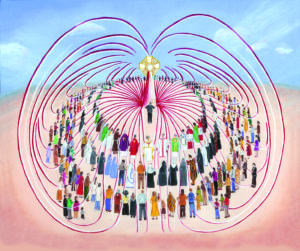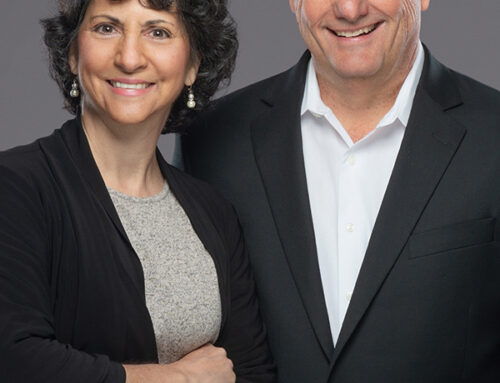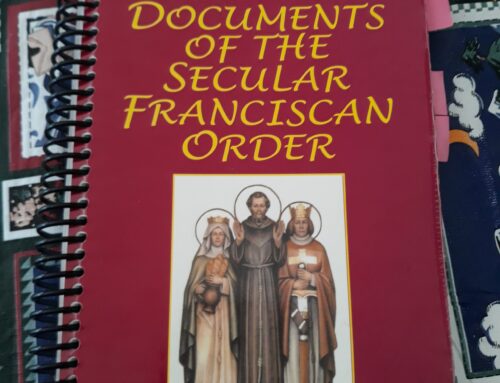 By Jan Parker, OFS
By Jan Parker, OFS
National Minister
The National Priority of Fraternity Life has never been more important than at this time of social distancing. Some of you have asked how to maintain fraternity activities during this time.
The following events can be held using video conferencing or conference call:
- Fraternity gatherings
- Fraternity Council meetings
- Initial formation sessions
Some fraternity events require personal presence:
- Elections
- Visitations
- Rite of Admission
- Rite of Profession
These must be postponed until we can meet safely in person, however, initial formation should continue in the manner described below.
Please see the following sections for detailed guidelines on all the above.
Fraternity Gatherings
We encourage fraternities at both local and regional levels to maintain fraternal bonds as much as you can. Be creative. Make phone calls, send cards or letters. Use technology to meet as a group (conference calls or teleconferencing, etc.) if possible. On a video conference some members will not have the ability to be “on screen,” but they can join by phone. Do your best to incorporate prayer and ongoing formation.
Fraternity Council Business
Fraternity Councils and Regional Executive Councils can conduct business by phone or teleconference. Decisions can be made by consensus or voice vote. (Note: A secret ballot is only required for elections or for approval of a Candidate for Profession.)
Fraternity Council Elections
Fraternity members, the appointed Presider and Ecclesial Witness must be physically present for an election. Elections involve voting by secret ballot, and this cannot happen by teleconference, phone or email. Mail in ballots are not acceptable for the following reasons: the reading of ballots must be overseen by the Presider and Ecclesial Witness, and there are multiple elections and a changing slate. Elections that cannot be held safely must be postponed.
What if postponement of an election is not a good option?
If a Council member is not able to continue to fulfill their duties during a term that has been extended due to the pandemic, then that person may resign. In this case the Council fills the vacancy in the usual manner.
Official Fraternity Visitations
Fraternity members and the Visitor(s) must be physically present for an official Visitation. An official Visitation cannot take place by teleconference. Visitations that cannot be held safely must be postponed.
Initial Formation
Initial Formation should continue during social distancing. However, every effort should be made to maintain the same standards followed for an in-person formation session.
- Material can be sent out by email or surface mail but discussion is still key.
- Engage everyone in discussion as it would normally take place at a formation gathering.
- This can be done by phone, conference call, Face Time, Zoom, Google Classroom—whatever is the most comfortable for the formation director and those in initial formation.
- Please resist the urge to combine classes. Orientation, Inquiry, and Candidacy sessions should be held at separate times as you would usually do.
- For those in initial formation, it is even more crucial at this time to have contact with their sponsors or a prayer partner.
- Formation team involvement is very important at this time.
For those fraternities currently meeting virtually, (by teleconference or video conferences)
Question: We have new members whom we want to welcome into the fraternity even though we are not meeting in person. Can we do this?
Answer: Ceremony of Introduction and Welcoming (p. 9 of the Ritual)
The Ceremony of Introduction and Welcoming can be celebrated by conference call OR video conference if the following conditions have been met:
- The individuals had been attending in-person fraternity meetings before the quarantine. (At least 2-3 meetings)
- They have been participating in the fraternity Zoom or conference call sessions. (At least two or three regular virtual fraternity gatherings)
- The fraternity council and the fraternity itself have had the opportunity to get to know them. (Either prior to social distancing or by talking to them on the phone and exchanging emails during social distancing.)
- The initial interview and faith summary have taken place. (This might have already been done prior to social distancing or it can be handled by phone or video conference [preferred, if possible].)
- Orientation lessons have been completed. (Not less than three months) This can be handled by phone, email or videoconference. Full sessions should be held, just as if you were meeting in person.
- Ensure that they have access to a short biography of St. Francis.
If all of this has been completed, the Ceremony of Introduction and Welcoming (p. 9 in the Ritual) lends itself to taking place during a videoconference (ex: Zoom, Go To Meeting). The Ritual says that it is to be kept as simple as possible; it is not a liturgical rite and should take place during the regular virtual fraternity gathering at the time of ongoing formation and socializing.
Question: We have Inquirers who are arriving at the time for the Rite of Admission. Can we celebrate the Rite during social distancing?
Answer: Rite of Admission (p. 11 of the Ritual)
It is not recommended that the Rite of Admission be carried out virtually. The Rite of Admission takes place within a liturgical celebration (not Mass). The fraternity really should be gathered in person for this to take place. (Depending on the social distancing guidelines of particular dioceses, it might be possible to have the Rite of Admission with a small group representing the fraternity. [See Ritual pp. 4 and 5 section 3.2 description of those to be present.])
However, determine if the following has taken place:
- Inquirers should have completed at least 6 months of focused discernment-(Inquiry classes—of the same length and nature that would have taken place before social distancing began. Once again, material can be emailed or surface mailed, but sufficient time should be taken for explanation and discussion.)
- Prior to the interviews, all sacramental certificates, and letters of recommendation should be received and reviewed by the Council.
- Two interviews (one by the Spiritual Assistant) to assess the readiness of the Inquirers to become candidates. (These can take place on the phone or via video conference.)
- A letter written to the Council by each Inquirer requesting admission to Candidacy. These can be emailed to the Formation Director who will share with the rest of the Council.
- Discussion and collegial decision of the Fraternity Council (GC 39.3)
- The Inquirers should be made aware of the seriousness of the Rite of Admission and why it is being delayed until the community can gather.
- Once all of the above has been completed, Candidacy classes can begin via video conference or conference call. Again, these should be of the same length and nature as prior to social distancing.
- When social distancing has ended, the Rite of Admission can take place in person. It should be noted in the fraternity register that the Rite of Admission was delayed due to social distancing and that Candidacy classes began on ___ date.
- The Rite of Profession will also need to be delayed until the fraternity can gather. This is necessary for two reasons:
- The Council needs decide by secret ballot on admission to profession of each candidate. (GC 41.1)
- The Fraternity needs to be present to witness the profession
- Even when social distancing ends and the Rite of Admission takes place (if it has not been possible beforehand), an appropriate interval (below) should elapse between the Rite of Admission and Profession. (As long as Candidacy does not extend beyond three years.)
- Explanation of appropriate interval:
The Rites of Admission and Profession offer separate and distinct opportunities for celebration, reflection, and the action of the Holy Spirit. Under the pandemic guidelines, someone could proceed through candidate formation for many months before participating in the Rite of Admission. Care should be taken to maintain an appropriate interval (at least six months) between the two rites to preserve the dignity and efficacy of each and to allow grace to act in the life of the candidate.
The National Executive Council thanks the National Formation Commission for their work on these guidelines.




Thank you for providing this guidance. We are a reactivated fraternity (Our Lady of the Angels in Geneva, NY) and have two women in formation.
Paz y todo bien, mi Nombre es Elena yo pertenezco a la Fraternidad de Nuestra Señora de los Angeles, a mi me gustaría saber si tienen algunas ideas de que forma podemos continuar con la vida fraterna cuando en esta Fraternidad la mayor parte son personas mayores y que no saben cómo usar los medios de comunicación y por causa de esta pandemia no podemos ir a ayudarles nosotros buscamos formas pero no emos encontrado como podríamos, gracias por su ayuda y por estos recursos que si son de mucha ayuda resiban un abrazo de su Hermana en Cristo.